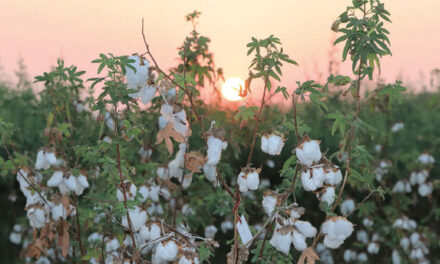 Cotton prices increased in the Brazilian market in February, boosted by international valuations and the fast exports pace. Between January 29 and February 26, the CEPEA/ESALQ Index for cotton raised by 10.7 per cent, closing at 5.0595 BRL per pound on February 26, the highest nominal level in the series of CEPEA for cotton, which began in July 1996.
Cotton prices increased in the Brazilian market in February, boosted by international valuations and the fast exports pace. Between January 29 and February 26, the CEPEA/ESALQ Index for cotton raised by 10.7 per cent, closing at 5.0595 BRL per pound on February 26, the highest nominal level in the series of CEPEA for cotton, which began in July 1996.
Cotton prices were also pushed up during the month as large amount of the current season crop was already sold, along with uncertainties about the size of the new crop, and sellers leaving the market, according to the Sao Paulo-based Center for Advanced Studies on Applied Economics (CEPEA). Buyers, on the other hand, were concerned about passing on cotton valuations to its by-products and, thus, were trying to extend the term of payment.
Despite the record harvest in the 2019-20 seasons, high international demand is lowering cotton supply in the Brazilian market, making sellers more unwilling to lower asking prices. Up to the third week of February, according to data from the Secretariat of Foreign Trade (Secex), Brazil had exported 179,700 tonnes of cotton, 5.8 per cent up from the volume shipped in the same period last year and the highest amount exported in a month of February since 1996. Between August 2020 and February 2021, Brazil exported 1.56 mn tonnes of cotton.
According to data released by the Brazilian Association of Cotton Producers (Abrapa) for 2020-21 crop, up to February 18, cotton sowing in the 2020-21 season had reached 96 per cent of the expected area in Brazil. In Bahia, the area sown was at 98 per cent; in Mato Grosso, at 95 per cent; in Minas Gerais, at 96 per cent; in Mato Grosso do Sul, at 99 per cent; and in Tocantins, at 98 per cent. In Goiás, Maranhão, Piauí, São Paulo and Paraná, sowing was over.
The area sown in the 2020-21 season may total 1.356 mn hectares, 16 per cent lower than the previous season, the Abrapa data showed. The association has revised productivity estimate down by 1.5 per cent to 1,770 kg per hectare. Thus, cotton production is expected to decrease by 17 per cent compared to that in the 2019-20 season, to 2.402 mn tonnes.










